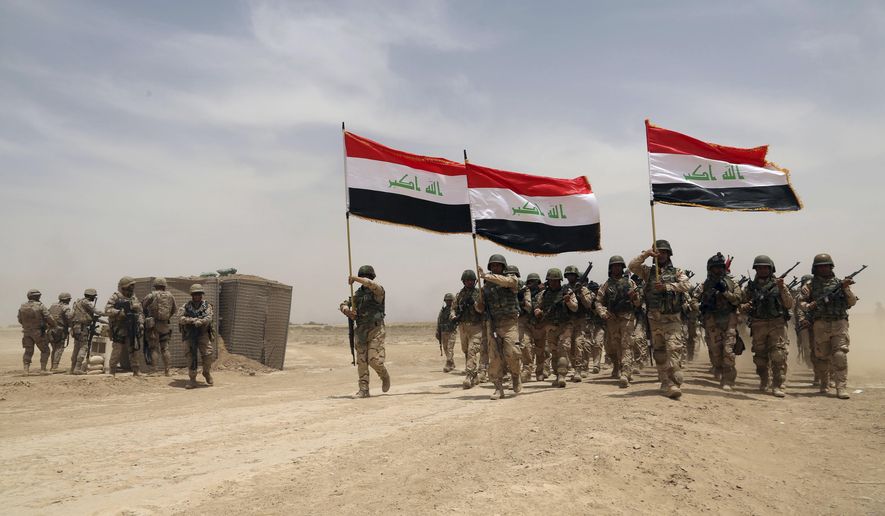WASHINGTON (AP) - A U.S. military member assisting Iraqi forces in their push to retake Mosul was killed by a roadside bomb Thursday, marking the first American combat casualty in the campaign to oust the Islamic State group from its last major stronghold in northern Iraq.
U.S. officials said the American was fatally wounded near the town of Bashiqa, north of Mosul. He was operating as an explosive ordnance disposal specialist in support of Kurdish peshmerga fighters who are part of an effort to recapture Mosul that began Monday.
A senior U.S. defense official said the service member was in an armored vehicle traveling with Iraqi special forces northeast of Mosul when the vehicle hit a roadside bomb, possibly rolling over.
The soldier was taken by medevac to the Kurdish regional capital, Irbil, but died of his wounds. The official was not aware of any others wounded in the blast.
The officials spoke on condition of anonymity because they were not authorized to publicly discuss details. The American’s identity was being withheld pending notification of his family.
He was the fourth U.S. combat death in Iraq since the U.S. began military operations against the Islamic State with airstrikes in August 2014.
It was not immediately clear whether other U.S. service members were hurt in the bomb attack Thursday.
Defense Secretary Ash Carter said the death was a “reminder that our people who are participating in the counter-ISIL campaign, whether they be flying aircraft or working with the Iraqi security forces and the other forces and enabling their consistent advances of the kind that we see in the region of Mosul today, are in harm’s way.”
He added that “this is necessary work, because it’s necessary for us to destroy ISIL in Iraq and Syria,” referring to IS by another acronym.
“Therefore it’s necessary for us to enable in this case the Iraqi security forces and the peshmerga in northern Iraq - and it appears that it was in that role that the service member was killed,” Carter added.
He said he had no other details.
Pentagon officials had acknowledged at the outset of the Iraqi-led offensive that U.S. special operations troops advising Iraqi security forces and Kurdish militia fighters could be wounded or killed as they advanced on Mosul.
Roadside bombs and other emplacements of improvised explosive devices pose a particular danger to advancing Iraqi forces and the U.S. advisers who are with them. The Islamic State group, which has occupied Mosul for more than two years, has prepared extensive defenses in and around the city.
More than 100 U.S. special operations forces are operating with Iraqi units, and hundreds more are playing a support role in staging bases farther from the front lines.
U.S. Central Command announced the death in a brief statement saying the service member was wounded by an “improvised explosive device.”
The assault on Mosul, Iraq’s second largest city, is bringing American forces into their most significant role in Iraq in years. There are more U.S. forces in Iraq now than any time since the 2011 U.S. withdrawal, and American forces have been increasingly active on and beyond front-line positions.
Asked earlier this week about the degree of risk facing U.S. special operations forces who are advising Iraqi forces in the Mosul operation, Pentagon press secretary Peter Cook said Iraqis are in the lead but efforts are being made to limit the risk facing U.S. troops.
“There are Americans in harm’s way as part of this fight,” Cook said Monday as the Mosul offensive was announced by the Iraqi government. “We’re very aware of that and we’re taking steps, as many steps as we can, to reduce the risk to American forces and we’ll continue to do that.”
There are approximately 4,800 U.S. troops in Iraq, according to the Pentagon. That doesn’t include another 1,500 troops considered there “on temporary duty,” whose number changes daily, according to the U.S. officials.
Three other service members have died in Iraq since the U.S.-led coalition began launching airstrikes against IS.
In October 2015, Master Sgt. Joshua Wheeler was killed when he and dozens of other U.S. special operations forces participated in a raid alongside Iraqi Kurdish forces to free IS-held prisoners.
Months later, Marine Staff Sgt. Louis Cardin was killed when IS fighters attacked a fire base in northern Iraq, and in May, Navy SEAL Charles Keating was killed in a firefight near Tel Askuf, also in the north.
___
Associated Press writers Susannah George in Khazer, Iraq and Joseph Krauss in Baghdad contributed to this report.




Please read our comment policy before commenting.